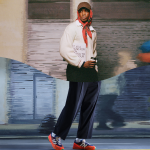
London Fashion Week to ban exotic skins
After furs, the fight against leather goods continues
November 29th, 2024
After endless protests by animal rights activists on the runway and outside the venues of Fashion Weeks worldwide, London has officially declared itself ready to abandon exotic leathers. Last year, while the London Fashion Week had banned fur from all shows on its calendar, the new regulation also excludes crocodile, snake, and other animal skins. The announcement was made this week by the deputy director for policy and engagement of the British Fashion Council, David Leigh-Pemberton, in the UK Parliament. It was in the summer of 2023 that Ingrid Newkirk, founder of the non-profit animal rights organization PETA, declared victory in the war against fur in fashion. Having reached that milestone, Newkirk explained, the organization continued its work, shifting focus not only to the use of leather at Fashion Weeks but also to wool and down. Beyond representing a major shift in favor of animals, London Fashion Week's decision to modernize could be part of a repositioning strategy in the international fashion scene, now divided between historic cities like Milan and Paris and "young" cities such as Copenhagen (one of the first places to ban fur and leather from its shows) and Seoul.
In recent years, numerous brands have adopted bans on the use of animal materials in their collections, a well-calibrated effort designed to respect consumer empathy—and thus remain relevant. While fur is primarily used in coats and is no longer considered essential in the industry’s imagination, the issue becomes more complex when it comes to leather goods: in luxury fashion, the preciousness of materials such as leather, crocodile, lizard, and suede significantly contributes to the high price of bags, shoes, and accessories, so it is not guaranteed that ethical choices will yield profits for brands as they did with fur. For luxury companies, removing exotic skins from their collections could mean accelerating the luxury crisis, a sector that has been significantly impacted in the past year by inflation and general consumer fatigue.
Changes in London are nothing new: the English Fashion Week has always been an incubator for young talents, capable of bringing new ideas to the runway. In recent seasons, the only "historic" brand that has continued to attract public attention has been Burberry, which abandoned exotic skins in 2022. In addition to implementing the ban, this week Leigh-Pemberton presented in Parliament a new set of standards that brands wishing to participate in future London Fashion Weeks must adhere to, chosen by the Institute of Positive Fashion of the British Fashion Council. Currently, Leigh-Pemberton stated, the organization is also considering eliminating the use of feathers on the runway.






















































